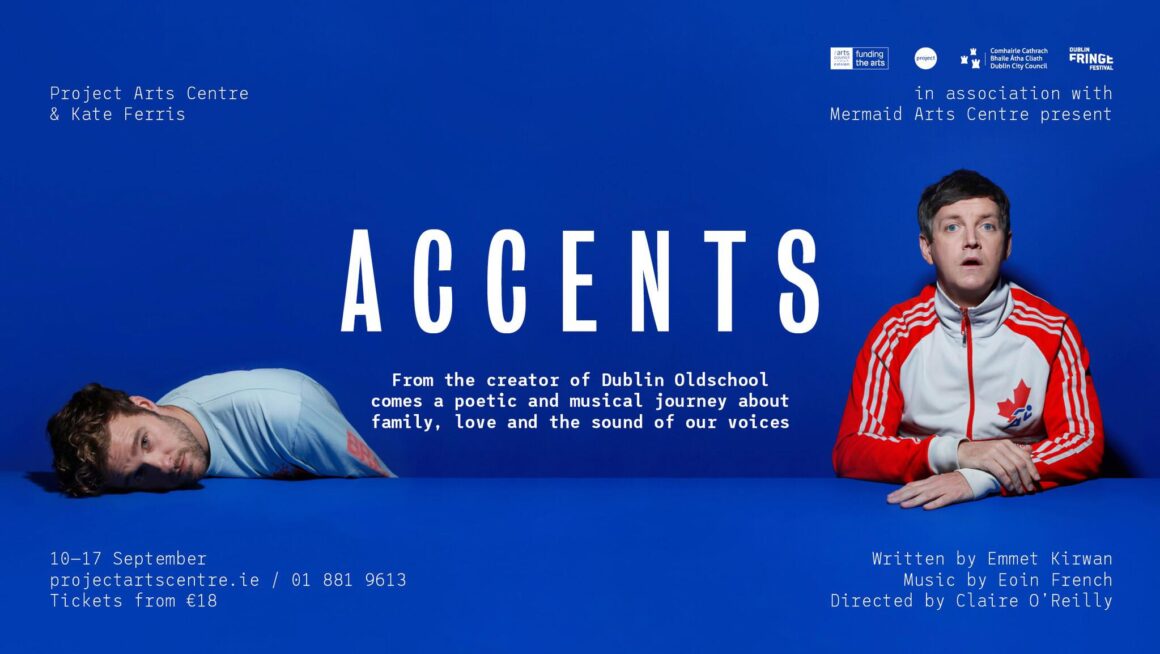By Emily Belton
Spoken word play Accents opened at the Project Arts Centre in Dublin on 11 September. Accents is written by Emmet Kirwan, commissioned by Dublin Fringe Festival and produced by Kate Ferris. The play is directed by Claire O’Reilly of Malaprop Theatre and scored by musician Eoin French, also known as ‘Talos’.
Backed by three musicians on separate platforms, Kirwan moves freely around the stage fuelled by attitude and purpose. There is resonance in his words, a conviction and fire in his belly. Composer Eoin French delivers music of real substance using ambient undertones, expansive piano and airy vocals. French offers plenty of refreshing ideas with an accessible sound that envelopes you rendering it highly effective. Kirwan’s musical way of speaking, his witty turn of phrase and the music’s strong sense of dynamics keeps the momentum rolling along nicely.
Director Claire O’Reilly does an excellent job at interpreting Kirwan’s spoken word script into what can only be described as a production that’s both fragile and powerful, curious and beguiling. The dark space is used for maximum effect with lighting that is beautifully restrained and assertive when Kirwans energy calls for it. Picking up on Kirwans honesty and modest flair, the director keeps the space minimal so as to not pervade the proceedings with distractions or frills. There is a vitality to be found in a production that shimmers with sound, momentum and pace.
Accents focuses on the assumptions we make when we hear an accent, the stigma attached to one’s accent and how it discloses which end of the class spectrum you are on – working class or ‘posh’. Kirwan is not ashamed of his strong Dublin working-class accent having grown up in Tallaght but hates the feeling of having to modify his accent depending on whose company he is in in order to be understood, because as Kirwan puts it, “You are either too Tallaght or not Tallaght enough”. Demonstrating the class divide while switching from posh to working-class articulation, Kirwan expertly jumbles all of these accents into something coherent with sudden shifts in tone and emphasis in all the right places.
Kirwan speaks of every parents’ principal wish; to be able to lay their new born baby down on a soft surface. But readily available soft surfaces are not easily found in landlord Ireland. One of the main themes Kirwan explores in this play is a delayed life. The delayed life Kirwan refers to is the unfortunate recent development of couples being compelled to start families later in life because they are forced into a failing rental market while trying to secure affordable housing during one of the worst housing crises Ireland has ever experienced. The way Kirwan reveals his anxiety and worry of bringing a child into the world while anticipating a future of instability that comes with endless home relocation is palpable.
Kirwan expresses what might become a sad reality for many first-time parents, which is knowing your child will grow up without a deep sense of community or a strong connection to a surrounding place of residence. Kirwan makes us question just how important the area in which we are born and raised is, and how it shapes who we become as people. As a proud Tallaght native, Kirwan speaks of the strong sense of place and community that exists in all working-class areas where public and social housing were built.
Kirwan’s family’s long history of living in inner city Dublin was met with uncertainty during the 1960s when families were being pushed out of the city’s old, condemned tenements and Georgian buildings into new corporation estates in areas such as Finglas, Tallaght, Coolock and Ballyfermot which were on the outskirts of Dublin City. Kirwan’s family had to learn to adapt and start a new life in the remote area of Tallaght. Generations of tight-knit inner city communities were dispersed, finding themselves in vast desolate and isolated places where council housing was built with few local amenities. Despite the many challenges of living in such deprived areas these families were raised knowing the strength and resilience of community, which allowed them to pull through. However, not everyone settled and those who were met with endless waiting lists for housing chose to emigrate.
Kirwan mentions the well-known history of Irish preferring to emigrate rather than riot when faced with deteriorating living conditions. It is no surprise that with the current rising cost of living and housing crisis there is now a resurgence of young people emigrating again in search of better lives. Kirwan’s struggles are laid bare knowing that his parents and himself as a parent, will always worry for their children because ‘what happens after the two-year lease is up’? Relocation, worry and flux? Unless, if instead of emigrating people choose to stay and “riot”; to put an end to the establishment parties’ repeated failures on housing and other social and economic policies, giving generations to come a sense of stability, community and connection.
Kirwan alludes to the integral role of women in working-class communities. Often the backbone of the household, the unpaid work of women and their role is recognised in these generally matriarchal working-class communities. While Kirwan speaks of the unique qualities of working-class communities such as their strong sense of belonging and social bond, he also highlights the pressures placed on men from working-class communities to fit a certain mould of blue-collar worker. Many are dismissive of alternative employment for men that’s not labour-intensive for fear of being perceived as a ‘soft-boy’. Kirwan wishes for this macho-culture to end as he will not allow his son to grow up not being able to dream big. This scepticism to white-collar work or working in the arts is likely due to the barriers that working-class people experience in attaining third-level education. Kirwan acknowledges working-class communities’ distrust of the government and the political system which has proved time and time again that it is rigged against them, allowing no equality.
Kirwan touched on his own experience of the devastating and harsh impact of Covid-19 restrictions placed on couples during pregnancy when women were forced to go through their prenatal appointments and in many cases child labour and the recovery period alone. Partners were prohibited to enter the hospital leaving women even more vulnerable during an extremely uncertain period of their lives when they needed the support the most. This callous and sexist attitude of the Irish government towards women has remained since the founding of the state and its servility to the Catholic Church.
The harsh reality of class was front and centre of Accents, however, capitalism and its impacts was the unsaid theme throughout play. The capitalist society uses class to divide and further the gap between rich and poor. The only way to end class stratification is to abolish class through the redistribution of wealth and introduce a planned economy where housing is a human right and not a commodity to be profited from. The post-crash boom generation living a life delayed as depicted in Accents dares theatregoers to imagine a new Ireland to fight for; one of community, secure public and social housing.












